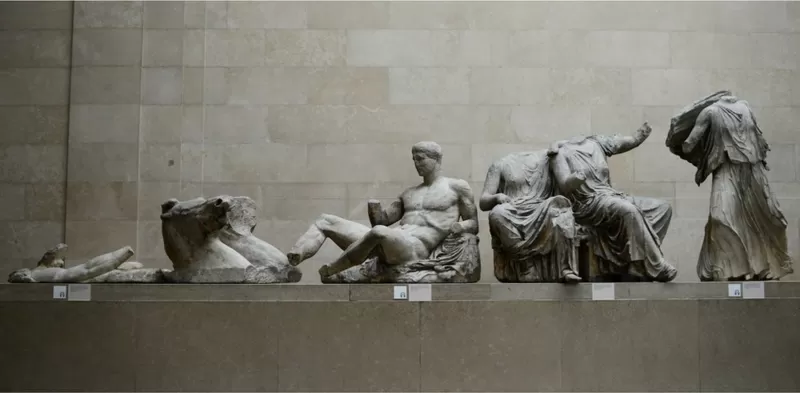Greece is prepared to part with some of its greatest treasures to “fill the void” at the British Museum if the Parthenon marbles were reunited in Athens, the country’s culture minister has said.
Speaking to the Guardian at the end of a momentous year for the campaign to retrieve the fifth-century BC masterpieces, Lina Mendoni promised that the London institution’s revered Greek galleries would never go empty.
“Our position is clear,” she said. “Should the sculptures be reunited in Athens, Greece is prepared to organise rotating exhibitions of important antiquities that would fill the void.”
Asked if particular works had been requested by London, the minister – a classical archaeologist by training – insisted continuing discussions had not extended to “specific artefacts”.
But for the first time she gave a glimpse of how far Athens was willing to go to compensate the British Museum for relinquishing the sculptures – seen as the high point of art in the classical age – saying any antiquities sent to the UK would also be crowd-pullers.
“[They] would fill the void, maintain, and constantly renew, international visitor interest in the Greek galleries of the British Museum,” Mendoni said, though she cautioned that “any agreement and all its particulars, would have to be in accordance with the Greek law on cultural heritage”.
Since the idea of a cultural exchange was mooted, soon after the centre-right New Democracy party of the prime minister, Kyriakos Mitsotakis, won power in 2019, speculation has been rife that treasures including Agamemnon’s Mask – the gold funerary mask described by some historians as the “Mona Lisa of prehistory” – could be sent to Britain in return for the marbles.
In a marked shift from the acrimony that has dominated Europe’s longest-running cultural dispute, both sides have begun to speak of “a partnership” that could offer a “win-win” solution to resolving the row.
George Osborne, the British Museum’s chair, responding to the drive by Athens to reunite the marbles, has appeared more determined to tackle the issue head-on than any of his predecessors.
He is the first museum chair to publicly acknowledge the controversy surrounding the antiquities’ presence in the British Museum. The museum bought them in 1816 from a bankrupt Lord Elgin, a former ambassador to the Ottoman empire, who himself had them removed from the Parthenon temple and elsewhere on Athens’ Acropolis with the use of marble saws.
The former chancellor has more than once this year hinted that a compromise settlement could be in the offing.
“We want to create a proper partnership,” Osborne told MPs on the culture, media and sport committee in October. “[One] that would mean objects from Greece coming here, objects that have potentially never left Greece before and certainly never been seen before, and objects from the Parthenon collection potentially travelling to Greece.”
Talks aimed at securing a loan deal would continue, he pledged, despite the diplomatic fallout that followed the British prime minister Rishi Sunak’s refusal to meet Mitsotakis in November.
The British Museum’s collection incorporates nearly half the 160-metre-long Parthenon frieze depicting the procession to the temple of the Panathenaic festival in honour of the warrior goddess Athena, as well as 15 sculpted panels and 17 pedimental figures that were part of its unique decoration.
Mendoni, who has repeatedly said Greece cannot discuss borrowing treasures that were plundered in the first place, added: “The Parthenon, a World Heritage monument, with its universal importance … demands its integrity in the place [where the sculptures were carved] and for the reasons that created it.”
She denied that the idea of establishing a branch of the British Museum at the Acropolis museum, purpose-built to display the statues, was back on the cards. “There’s been no such discussion,” she said. (Guardian)
